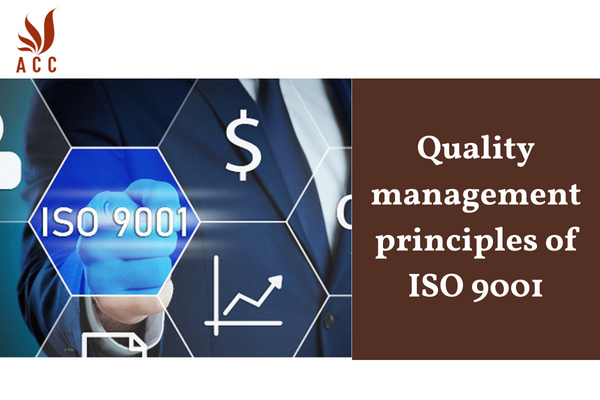In today's competitive and globalized business environment, organizations are under increasing pressure to deliver high-quality products and services that meet the needs of their customers. ISO 9001, the international standard for quality management systems, provides a framework for organizations to achieve this goal.

Quality management principles of ISO 9001
1. Customer focus
The first principle of quality management is customer focus. This means that organizations should focus on meeting the needs and expectations of their customers. To do this, organizations should understand the needs of their customers, both current and future. They should also communicate with their customers to get feedback on their products and services.
2. Leadership
The second principle of quality management is leadership. This means that leaders should create and maintain a supportive environment for quality. They should set clear goals and expectations for quality, and they should provide resources and support for quality improvement.
3. Involvement of people
The third principle of quality management is involvement of people. This means that organizations should involve all employees in quality improvement. Employees should be encouraged to participate in decision-making, and they should be given the opportunity to learn and grow.
4. Process approach
The fourth principle of quality management is process approach. This means that organizations should view their activities as a series of processes. By understanding and managing these processes, organizations can improve their efficiency and effectiveness.
5. Continual improvement
The fifth principle of quality management is continual improvement. This means that organizations should constantly seek to improve their products, services, and processes. This can be done through a variety of methods, such as root cause analysis, corrective and preventive action, and benchmarking.
The seven principles of quality management are the foundation of ISO 9001. By following these principles, organizations can improve their ability to meet the needs of their customers and achieve their business goals.
Additional information
In addition to the seven principles, ISO 9001 also includes a number of requirements for quality management systems. These requirements cover areas such as planning, documentation, control, and improvement. By meeting these requirements, organizations can demonstrate their commitment to quality management.
6. Frequently asked questions
Question 1: What is the purpose of ISO 9001?
Answer: ISO 9001 is a globally recognized standard that outlines the criteria for a quality management system. Its purpose is to help organizations ensure they meet the needs of their customers and stakeholders while meeting statutory and regulatory requirements related to their products or services.
Question 2: What are the key Quality Management Principles of ISO 9001?
Answer: The key principles include customer focus, leadership, engagement of people, process approach, improvement, evidence-based decision making, and relationship management.
Question 3: How does ISO 9001 promote customer focus?
Answer: ISO 9001 emphasizes understanding the current and future needs of customers, meeting their requirements, and striving to exceed their expectations. Customer satisfaction is a central focus, driving continual improvement.
Question 4: What is the significance of the process approach in ISO 9001?
Answer: The process approach involves understanding and managing activities as interconnected processes. This helps organizations achieve their intended outcomes more efficiently and consistently, leading to improved performance.
Question 5: How does ISO 9001 encourage continual improvement?
Answer: Continual improvement is a fundamental concept in ISO 9001. Organizations are expected to regularly assess their processes, products, and services, and implement actions to enhance performance and meet objectives.
Question 6: Why is evidence-based decision making important in ISO 9001?
Answer: ISO 9001 emphasizes making decisions based on the analysis and evaluation of data and information. This ensures that decisions are informed, objective, and contribute to the overall effectiveness and efficiency of the organization's quality management system.
Nội dung bài viết:






Bình luận